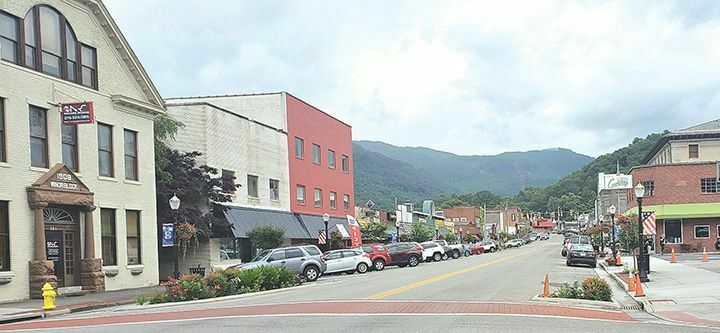Businesses struggle, adjust under COVID-19 threat
 Lunchtime on Wood Avenue in downtown Big Stone Gap is bustling with business again, with four restaurants open. However, some proprietors are maintaining tight safety controls. TERRAN YOUNG PHOTO
Lunchtime on Wood Avenue in downtown Big Stone Gap is bustling with business again, with four restaurants open. However, some proprietors are maintaining tight safety controls. TERRAN YOUNG PHOTO
Local businesses are trying to bounce back as the COVID-19 pandemic and Gov. Ralph Northam’s related safety mandates have slowed down commerce.
“At first it was scary,” said Chris Williams, newly elected Appalachia town council member and owner of Second Chance Tire.
His business was considered essential, so he didn’t have to close. “The last week of March and most of April, we didn’t know what the next day would bring.”
Williams continued: “Our shop saw days that sales were less than $100. One day our total sales was $35. This was during what usually is your busiest time of the year. Tax return season.”
Williams is also a founding member of Appalachia Main Street, the town’s business association. “Our newly formed group of business owners had a very positive attitude and a good game plan. We had a really good start on this plan, then COVID-19 made its attack.”
The biggest blow to Appalachia Main Street was having to cancel the first event the group had planned. “Our group stayed in touch with a group chat, but no one knew what to do next,” said Williams.
“Appalachia Main Street started in-person meetings after the governor approved phase two,” said Williams. “We are back to work on planning the future of Appalachia’s Main Street and will be announcing the opening of two new businesses in Appalachia in the near future and more good news coming a little later this summer.”
Williams stated that the town encourages every healthy person to spend money at local businesses. “Do so in a safe manner and always practice guidelines that the health department has recommended.”
As for his tire business, Williams said he saw activity pick up in May. “The stimulus funds that were sent out saved most small businesses. People also got a little more confident in May. More information was released on how to stay safe and we all knew a lot more about COVID-19.”
In Big Stone Gap, some non-essential businesses chose to close before the governor’s mandates took effect.
The Appalachian Artisan owner Kendra Mullins shifted her business from making clothing, jewelry and other handmade items to making masks in mid-March.
“The demand for masks was so large that I couldn’t do anything else until about two weeks ago,” said Mullins.
When asked why she chose to close her shop before it was mandated, she replied, “I couldn’t handle the thought of being a part of an issue with even one person falling ill and, even worse, dying from it.”
Mullins stated closing her business was a “scary decision, being a new business owner,” but she followed her instincts. “It was the best thing to do, simply put.”
Fortunately for Mullins, it paid off. Mullins stated that she and her husband worked up to 17 hours a day until they were able to get help.
“I had to hire help,” said Mullins, who explained that six people in addition to herself and her husband assisted in mask making.
“My cousin Chucky Miller, an Army veteran, came to the rescue first with a willingness to learn to sew exactly to my standards,” said Mullins.
Mullins named several other people who assisted with the multi-step process of mask making, including laid-off Curklin’s employee Megan Addams and Curklin’s owner Tracey Jordan.
As a restaurant, Curklin’s was considered essential and could be open for take-out, but Tracey and her husband Wayne decided to close its doors temporarily.
“We decided on closing due to everyone’s safety first, and it was very hard to operate never knowing how much business we were going to get from carryout only,” said Jordan.
She explained that the restaurant has 50 employees. “We couldn’t determine who could work and who couldn’t. They are all great, so we couldn’t do that.”
Restrictions have since eased. The restaurant has re-opened for dine-in and take-out and now offers outdoor seating. Servers are wearing masks and the laminated menus have been replaced with disposable paper ones.
“It’s been steady,” said Jordan of the business. “We’ve been very blessed to have the support of customers and our local communities.”
Jordan stated that the changes the restaurant has had to implement have been difficult. “We’ve had to learn a whole new way of operating. Overall, we are thankful to have been able to reopen and offer the jobs back to our employees.”
As for Mullins, short on help since the re-opening of Curklin's and nearly 17,000 masks later, she admitted she is tired of making them. “I figured if doctors and nurses have to wear masks all day long, it won’t kill me to make them all day so those medical professionals and our might have a lightened load.”
While people are able to order Mullins’ other products for sale online and pick up items at the window, Mullins still hasn’t re-opened her store to the public.
“I rely on what my instincts tell me, and right now is not the time for me,” she said. “For me and my business, this decision is not about politics or liberties being taken.”
Mullins stated that the demand for masks is still very high. She explained that making the masks, and the inventory that comes along with it, takes up so much space that there wouldn’t be room for customers in the store.
“I don’t have an answer for when I can reopen,” said Mullins, “I feel like the virus will answer that for me in due time. One thing I know for sure is we are eager to never need to make another mask. Until then, ignoring the threat of a serious outbreak in our amazing community is too risky for me.”
Please support The Big Stone Gap Post by subscribing today!
 Loading...
Loading...

.png)
